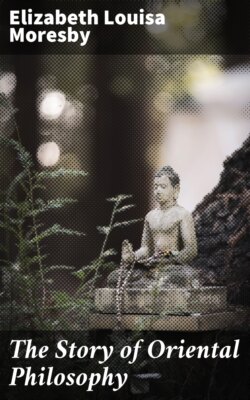Читать книгу The Story of Oriental Philosophy - Elizabeth Louisa Moresby - Страница 9
На сайте Литреса книга снята с продажи.
A father says to his son: “Fetch me a fruit of the nyagrodha tree.” “Here is one, sir.” “Break it.” “It is broken, sir.” “What do you see?” “Almost infinitesimal seeds.” “Break one.” “It is broken, sir.” “What do you see?” “Nothing, sir.” The father said:
ОглавлениеTable of Contents
“My son, that subtle essence there which you cannot perceive, of that very essence this great nyagrodha tree proceeds. Believe it, my son. In that which is the subtle essence every existent thing has its Self. It is the Self and you, O Shvetaketu, are that.”
How pale beside this eternal wisdom are the bloodless spectral worlds after death of Greece and Rome. In the words of a great Indian thinker: “Coming and going is all pure illusion; the soul never comes and goes. Where is the place to which it shall go when all space is within the soul? When shall be the time for entering and departing when all time is in the soul?” It must be remembered that the story of Nachiketas not only conveys the highest teachings of the Vedanta, but is an early and most beautiful story of rebirth. He dies, dwells in the house of Yama, the god of death, and returns to earth to bless it with his wisdom in a new birth.
And it must never be forgotten that in the eastern philosophies there is an open meaning for the many and a hidden meaning for the few who are thus initiated and instructed. This is emphatically so with the Vedanta and certain teachings of the Buddha.
Moving about in India, Ceylon, Burma, and Japan, one is much struck with the fact that these esoteric meanings are most carefully guarded and seldom meet the observer except in the most favorable circumstances. Yet they are none the less there and known to those who are able to penetrate beneath the surface.
